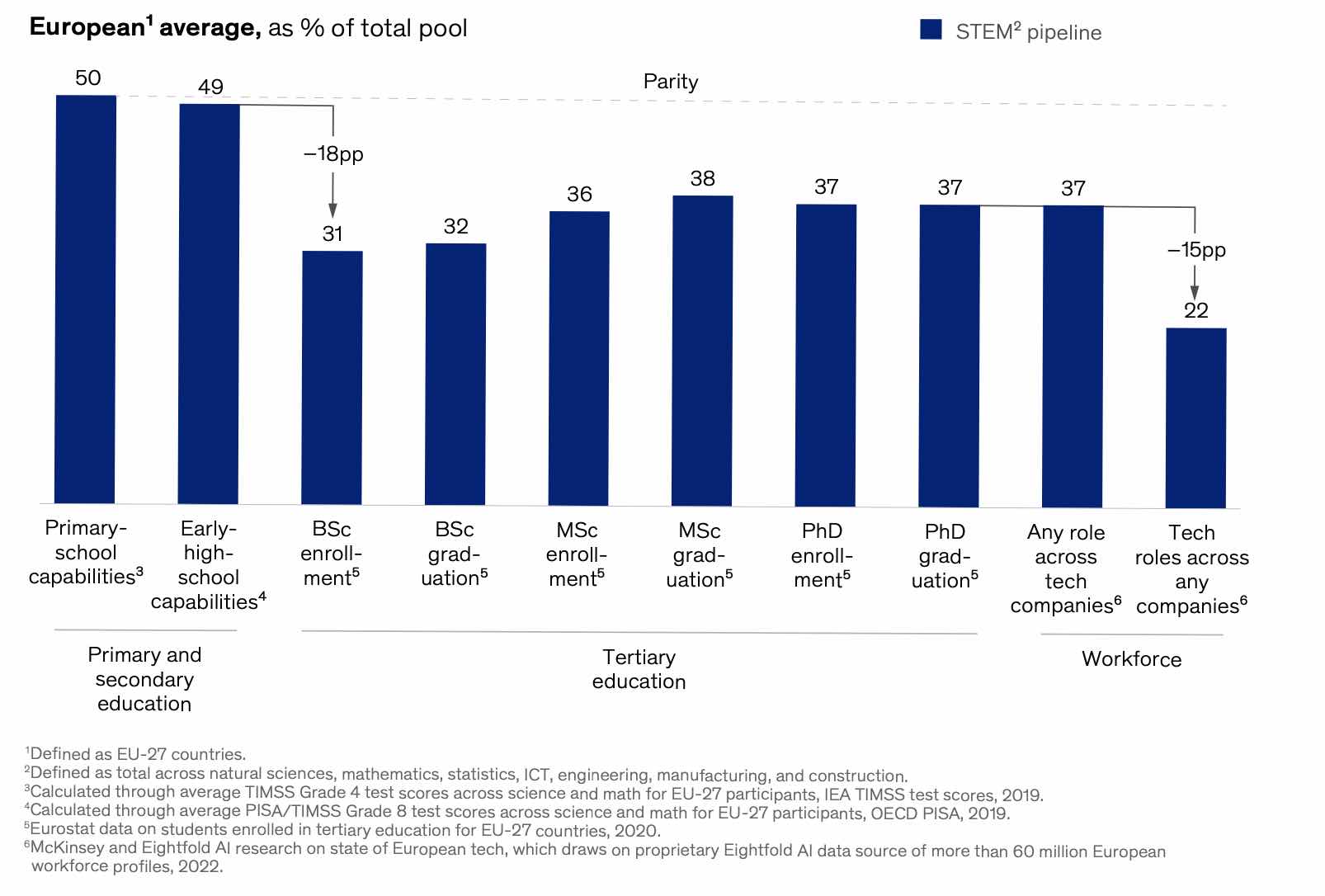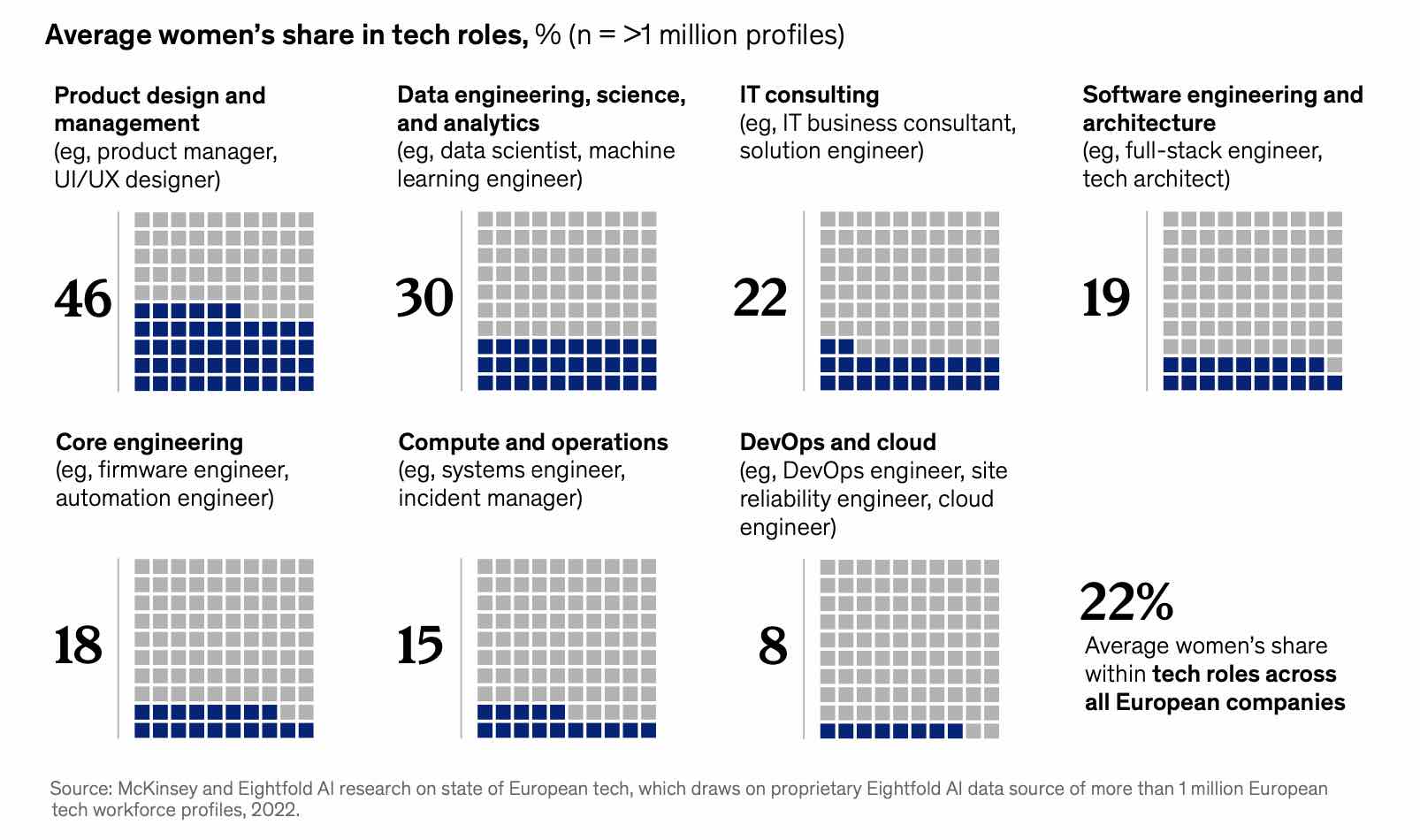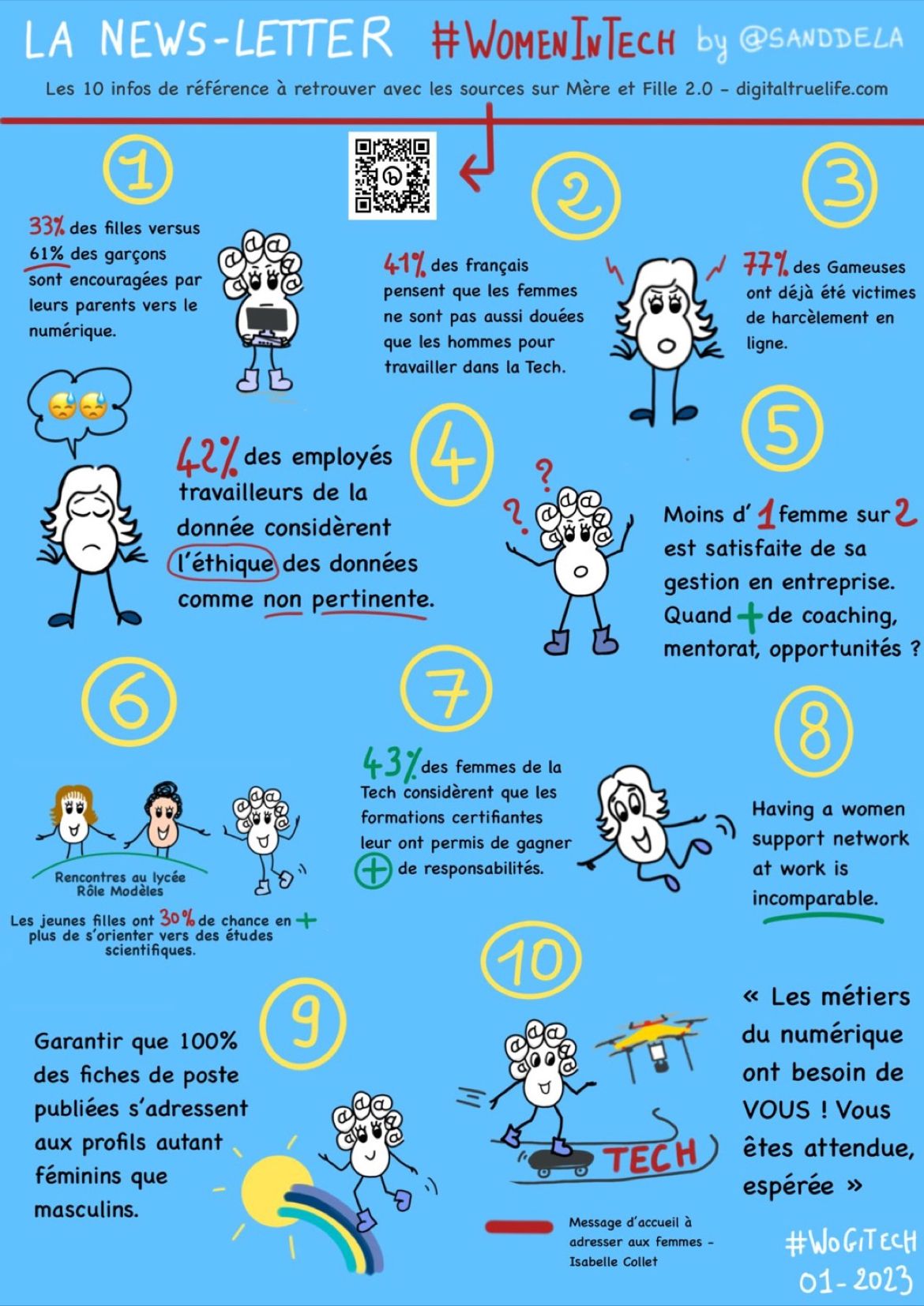There’s no shortage of speeches. Nor are there enough examples of remarkable, successful women who don’t get enough coverage in the media. Just think of Aurélie Jean (scientist and entrepreneur), Céline Lazorthes (founder of Resilience Care, Leetchi and MangoPay), Roxanne Varza (director @Station F), and so many others. There’s no shortage of initiatives by institutions or government, higher education establishments and businesses, to create career paths and conditions that are favorable to women. The problem runs deeper. The distortion is growing. The figures bear this out, whichever way you look at it.
Women have a very small place in French tech !
As Laurent Champaney, Managing Director of the École Nationale Supérieure des Arts et Métiers, points out in an article for Les Echos, “the situation is implacable: the overall rate of women in engineering jobs will remain below 10% in France in 2020, and less than 30% of engineering school students will be women. Furthermore, we read with amazement that 88% of fundraising in tech is carried out by 100% male teams and less than 1% by all-female teams. While we can find reasons to hope for improvement in the increase in the percentage of women in digital professions, from 12% to 17%, between 2018 and 2021, there is still a long way to go.
In a McKinsey study published in January 2023, we learn that women occupy just 22% of tech jobs in Europe. This confirms that France is not on the right track when it comes to gender diversity, and is doing less well than some of its neighbors. Are we still living in a patriarchal society? Yet Mc Kinsey predicts, according to various scenarios, that the labor shortage will be at its worst by 2027, with between 1.4 and 3.9 million jobs to be filled in the technology sectors of the EU-27.
Figure 1: Women’s participation in ICT-related disciplines falls drastically on entering higher education and the job market [McKinsey, 2023].

We might continue to believe that girls are less attracted to or less successful in the technical subjects taught in primary and secondary schools, but the study shows that this is not the case. In some European countries, they are even ahead of boys on these subjects. Figure 1 shows that entry to higher education is the first break in equal opportunity. From Bachelor’s level onwards, only between 31% and 36% of students in technology courses are women. While this figure rises slightly up to doctorate level, the second abyss stands in front of future professionals: that of the first job. By the time they enter professional life, only 22% of women hold a tech job in companies across all sectors, while 37% of jobs of all kinds are held by women in technology companies.
The jobs where women are least well represented are those most closely related to development, code, DevOps and the cloud. In the latter two categories, despite their high demand, the proportion of women is below 10%.
Figure 2: Across European companies, women are least represented in DevOps and Cloud functions [Mc Kinsey, 2023].

Where does this flaw in our education systems come from? Is it more a problem of the culture and society we have inherited?
Let’s go back a few decades. In 1982, nearly 30% of computer scientists were women. Further back, in 1969, when man first set foot on the moon, it was a woman, Margaret Hamilton, who designed the first onboard system for the Apollo 11 mission. The film “Les figures de l’ombre”, released in 2016, features African-American women who played a major role in NASA’s programs, including Katherine Johnson, who calculated the trajectories for the Apollo 11 mission. In 1960, coding jobs in England were almost exclusively held by women.
It was in the 90s that two major movements reversed this trend.
It was in the 90s that IT became a strategic issue for governments and companies, gaining a prestige that immediately attracted a very male population. It was also at this time that computers became personal. And it was men and their sons who rushed to buy this new equipment and immediately adopted it into the family home.
And yet, our country, even more than others, would benefit from restoring a better balance. If France were to achieve parity in the digital sector, it would generate a 10% gain in GDP by 2025, according to a McKinsey study.
How can we give women back a better place in tech?
Isabelle Collet, a computer scientist and professor of education at the University of Geneva, explains that 2015 saw a turning point with a realization that the problem was not women, who were suspected of being less interested in technology than men, but institutions and organizations that were doing nothing or not enough to attract them. Isabelle Collet published a book “Les oubliées du numérique” in 2019, which sheds a strong light on the transformation needed. She explains that, first and foremost, we need to interest young women in applying for both higher education courses and the technical jobs that are opening up to them. There is also an urgent need to offer gender training courses to students, to show them the need for a diversity of profiles, and to explain that encouraging female employment is a way of making up for the consequences of the social censure that women have endured since childhood.
“To encourage more girls to go into these professions, one of the very first things is to say: it’s not so much you who need this profession. It’s this profession that needs you: you’re expected, you’re hoped for, and we’d like to see more of you in it”, says Isabelle Collet.
Associations such as Femmes@Numérique (of which Isabelle Collet is a member of the Board of Directors) and the Sista movement, a collective aiming to reduce inequalities between women and men entrepreneurs, headed by Déborah Loye, regularly speak out on this issue.
This is also the case for #WomeninTech, who recently published an infographic by Sandrine Delage, in which we highlighted a few significant figures on the French mindset :
41% of French people think that women are not as good as men at working in tech
Over 58% of parents admit that they don’t encourage their daughters to go into technological training
61% prefer to steer them towards an “easier” profession
41% think that these sectors are anxiety-provoking and difficult for women

The findings, the awareness and the voice given to women in digital technology, who are also entrepreneurs, should inspire those in charge of higher education. There is an urgent need to better welcome, promote and distinguish women in tech. While role models are not the only way to attract new generations to these professions, the fact remains that the visibility of women in the media could be much higher.
So what’s the opinion of a leading figure in the education and technology eco-system, such as Anne-Charlotte Monneret, General Delegate of the EdTech France association :
“The pop-culture of tech as a domain reserved for young men comes to us from the USA, with the image of the “geek”, hooded teenagers adept at gaming and coding. It’s the consequence of Hollywood movies, which have imposed white, affluent, male profiles as tech referents for the past thirty years. But the problem is that this is not countered by putting forward female role models who could seduce or reassure young tech-savvy girls. No doubt the other cliché that tech is a field reserved for engineers doesn’t help, whereas there are many other professions and training courses that are useful to tech companies.”
Source : podcast LUDOMAG, Janvier 2023
What can be done to overcome these clichés, even though companies are often aware of or committed to the issue of diversity ? Will we find any reassuring elements in the strategic vision for digital education presented by Pap Ndiaye, Minister of National Education and Youth, on January 27 ?
Consult the Digital Strategy for Education 2023-2027
Are the efforts being made in this direction promising?
Even before the implementation of certain ministerial directives, we can see that both engineering schools and universities have made great efforts to attract female students to these technological fields. Some associations have even gone so far as to offer 100% female training courses, as at Social Builder, which has already trained 3,000 women in code in 34 promotions. “In this single-sex environment, women progress faster, feel more at ease, have more self-confidence and feel more legitimate”, promises Social Builder.
This is probably not a solution for higher education establishments, which on the contrary – and rightly so, it seems – believe that gender diversity is beneficial to everyone’s personal development.
However, it’s worth remembering that in IT schools, “7 out of 10 female students say they have been subjected to sexist behavior during their training, ranging from jokes and sexist remarks about their skills, to sexist or even sexual harassment”, according to a Social Builder study.
So, in response, some are focusing on various ways of reducing or eradicating self-censorship, the fruit of cognitive biases at all stages of the career path, which suggest that everything scientific, mathematical or technological has been invented, developed and used by men. Young women are the “forgotten ones of history”, so they tend to believe stories that magnify the role of men. “We need to stop self-censorship by providing information and desacralizing IT, by breaking the codes”, asserts Chloé Hermary, CEO of Ada Tech School, housed at Station F within the HEC incubator. Ada Tech deliberately communicates on very feminine codes, and gets results, since 80% of the school’s enrolment is female.
Everyone agrees that women have their place in tech, as in all professions. University and private training programs are making real efforts to welcome and encourage them. We need to continue this fight with determination, at a time when it is predicted that there will be a shortfall of over 200,000 vacancies in the tech and digital professions.
“The digital sector creates thousands of jobs every year, even during the Covid crisis. Over 34,000 net new jobs have been registered for 2021. And recruitment is growing every year. We’re announcing 230,000 recruitments by 2027 in the sector”, recently declared Sonia Malinbaum, Chairwoman of Numeum’s Employment and Training Committee.
All these initiatives are a further step towards gender diversity. We are convinced that higher education institutions have a major role to play in this fight for women.
In fact, Simone has formed a perfectly mixed team of robots to set an example!






